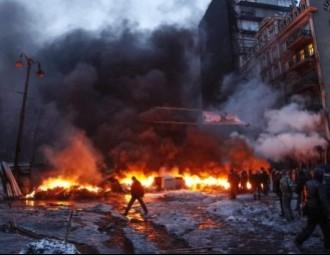Belarus unites in support of Ukrainian civil society

Human rights organizations, journalists and NGOs voice their solidarity with the colleagues in Kiev and urge the Ukrainian authorities to stop using brutal force and observe human rights.
Belarus unites in support of Ukrainian civil society
Human rights organizations, journalists and NGOs voice their solidarity with the colleagues in Kiev and urge the Ukrainian authorities to stop using brutal force and observe human rights.
EuroBelarus Information Service has already informed about the appeal of the Civil Society Forum, which calls to cease financing of the establishment of dictatorship in Ukraine, as well as suggested European politicians to sign a Charter of Fundamental Rights and Freedoms. Shortly afterwards Belarusan civil society organizations made an open appeal, calling for stop of bloodshed in Kiev.
Human rights organizations also voiced their stance about what is happening in Ukraine. Thus, in the joint letter to President Viktor Yanukovich, members of the Human Rights House Network (HRHN) call upon him to veto a law adopted by the parliament on 16 January 2014 violating most fundamental rights to freedom of expression and assembly, as well as basic rights to associate and work for a non-governmental organisation, including the right to be a human rights defender. As humanrightshouse.org informs, NGO’s call upon the Ukrainian President to “take concrete measures aiming at stopping the use of force by police to disperse protestors, even if they occupy governmental buildings, and to publicly acknowledge the right of anybody to peacefully protest and the duty of the State security forces to protect peaceful protestors”, as well as “immediately and unconditionally drop all charges against peaceful protestors and journalists, release and compensate all of them”.
Members of the International Federation for Human Rights (FIDH), among which is the Belarusan Human Rights Center "Viasna", have written an open letter to Ukrainian President Viktor Yanukovich and Parliamentary Speaker Volodymyr Rybak in regard with the adopted law. In this letter, human rights activists voiced their “deepest concern over the adoption of this new text, which does not only mark a legislative setback for freedoms of association and expression, but also sends a biased and highly negative message about the nature of the activities carried out by human rights organisations in the country, and put all their members at a high risk of judicial harassment”. As spring96.org reports, FIDH urges its addressees “to take steps to repeal this law immediately and unconditionally, to ensure in all circumstances that all human rights defenders in Ukraine are able to carry out their legitimate human rights activities without any hindrance or fear of reprisals, and to conform in all circumstances with the international standards and instruments ratified by Ukraine”.
Belarusan journalists expressed solidarity with their colleagues, reports the press service of the Belarusian Association of Journalists (BAJ). “Now, as never before, the Ukrainian society and the international community need information about what’s going on, - is said in the appeal signed by the board of BAJ. – Nobody will do it for journalists”.
The journalists “call on the authorities of Ukraine to stop the insulting practice of using brutal force against our colleagues”, and also recall the newly adopted law, backing “the demand to review newly adopted legislation in Ukraine which significantly restricts not only civil rights, but freedom of word”.
Not only organizations express solidarity with Ukraine. These days common people in Belarus lit candles as a tribute to the memory of the killed in Ukraine. Minsk residents brought flowers and lampions to the statue of Ukrainian poet Taras Shevchenko not far from Ukraine’s embassy building, informs Belsat. Brest residents laid flowers to the stutue of Kobzar in Shevchenko boulevard and stuck placards ‘Maidan, we are with you!’, ‘Glory to Ukraine. Glore to heroes!’
-
03.01
-
07.10
-
22.09
-
17.08
-
12.08
-
30.09










































